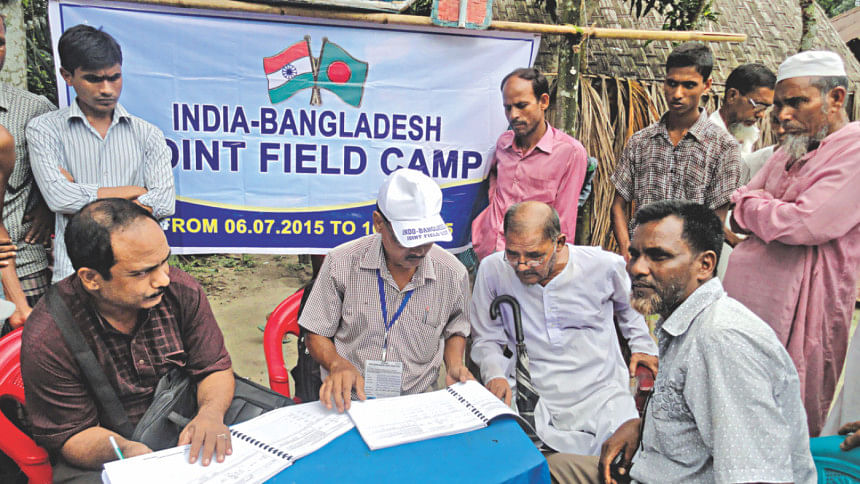Survey begins in 162 enclaves

Most residents in two Indian enclaves inside Lalmonirhat and Kurigram want to get Bangladeshi citizenship as the two neighbouring countries jointly launched a survey on 162 enclaves yesterday.
A total of 190 enumerators -- 95 each from Bangladesh and India -- started the survey at 10:00am. Of them, 136 are conducting the survey in 111 Indian enclaves in four districts of Bangladesh -- 12 in Kurigram, 59 in Lalmonirhat, 36 in Panchagarh and four in Nilphamari.
The enumerators will carry out the survey on the enclave population and land area and find out the residents' choice of nationality. The survey will continue till July 16 and the results will published on July 20.
The survey comes after the signing of a protocol by the two countries last month to ratify the Land Boundary Agreement (LBA). It will bring an end to the long-standing unresolved issue of nationality of thousands of enclave residents.
The two countries have imposed a ban on sale and purchase of land in the enclaves till midnight July 31 when the formal handover will begin. The ban has been in force to prevent outsiders or any quarters from creating any trouble over the ownership of land during the interim period, said foreign ministry sources.
Deputy Commissioner of Kurigram Khan Mohammad Nurul Amin launched the survey in the Indian enclave of Dashiarchhara in Phulbari upazila of the district.
Enumerators found that people do not want to go to India as they have a socio-economic bonding with Bangladesh.
Working in Bashpatai enclave inside Kolaghat union of Lalmonirhat Sadar upazila, Indian enumerator Harish Chandra Barmon said, “I didn't find a resident who wants to become an Indian national. We are collecting signatures and fingerprints of the enclave people.”
Talking to The Daily Star, many people expressed their desire to become Bangladeshi citizens.
“All the enclave residents, regardless of Muslims and Hindus, want to get Bangladeshi citizenship,” said 45-year-old Nazrul Islam of Bashpatai enclave.
People have been living on this soil since their birth and have become used to the Bangladeshi culture, he added. “We won't be able to adopt a new culture at this stage of our life.”
Aminul Islam, 55, of the same enclave said they are now engaged in different jobs to earn their living. “What kind of work would we do there [India]? We have to live here to earn our bread and butter.”
Ranjit Chandra Das, 46, said they built relations with the local people through marriages. “We have married off our sisters and daughters here. How would we leave them now?”
Enumerators said they were conducting the survey following the records of the joint census in 2011. “We are registering people who were born after 2011, and dropping the names of those who died after 2011,” said Jahangir Alam, a Bangladeshi enumerator working in the Indian enclave of Bashpatai.
“Apart from going door to door, we are also asking people about their choice of country they want to live in,” he added.
Members of law enforcement agencies and village police accompanied the survey teams.
In Kurigram, a control room was set up at the deputy commissioner's office for conducting the survey on 12 Indian enclaves inside the district.
Sohel Maruf, executive magistrate of Kurigram, said the enclave residents would have to decide on their citizenship before the survey ended.
In Panchagarh, 18 camps were set up for running the survey-related activities in 36 enclaves inside the district.
Golam Mostafa, general secretary of the Bangladesh unit of the India-Bangladesh Enclave Exchange Coordination Committee, demanded the authorities bring back the enclave people who went to different districts of the two countries in search of jobs.
There will be no existence of the enclaves after July 31 midnight as the governments of India and Bangladesh will finalise the list of citizens by then.
The Indian parliament unanimously passed a constitution amendment bill in May to pave the way for implementing the LBA. The protocol for exchange of enclaves was signed between the two countries during Prime Minister Narendra Modi's visit to Dhaka last month.
Our correspondents in Lalmonirhat, Kurigram and Thakurgaon contributed to this report.

 For all latest news, follow The Daily Star's Google News channel.
For all latest news, follow The Daily Star's Google News channel. 



Comments